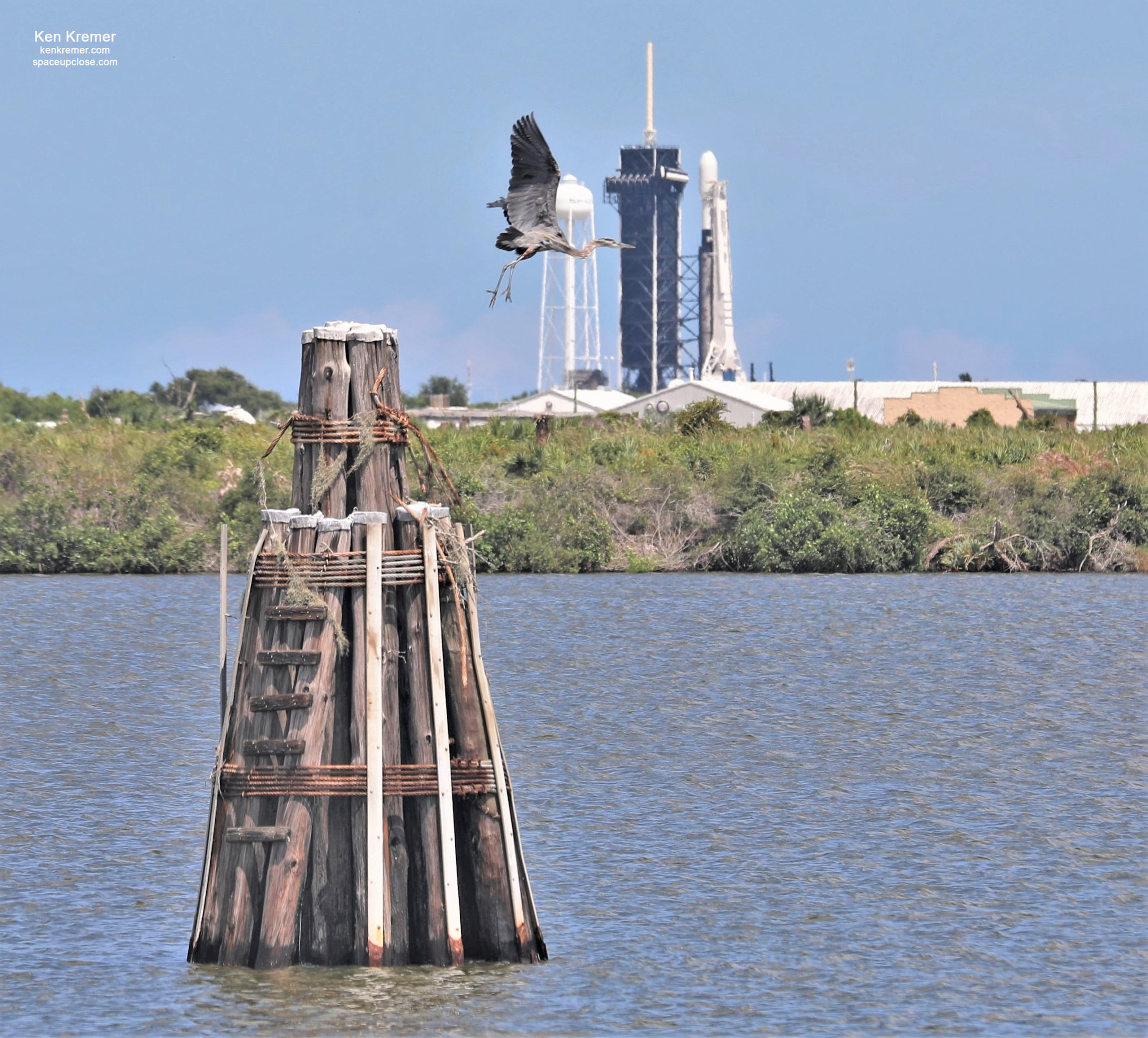
Heron awaits SpaceX Falcon 9 launch at KSC LC-39 Press Site – then flies away after SpaceX engineers call scrub as final countdown was to begin due to poor booster landing recovery weather in the Atlantic Ocean. Recycled Falcon 9 for 13th Starlink comsat launch stands vertical at Launch Complex-39A on NASA’s Kennedy Space Center for launch scrubbed from Sept. 17, 2020. Credit: Ken Kremer/kenkremer.com/spaceupclose.com
For SpaceUpClose.com & RocketSTEM
KENNEDY SPACE CENTER, FL – A combination of multiple powerful Hurricanes and Tropical Storm systems in the Gulf and Atlantic forced SpaceX to postpone Thursday’s afternoon blastoff of a ‘flight-proven’ Falcon 9 less than 40 minutes before the planned Sept. 17 liftoff of the next batch of Starlink internet satellites to orbit from the Florida Space Coast because of hefty churning ocean swells and poor weather conditions negatively impacting the recovery area – thus making a safe landing of the Falcon 9 1st stage and payload fairings pretty much impossible.
SpaceX has not yet been announced a new target launch date for Starlink due to continuing awful Atlantic Ocean weather forecasts including Hurricane Teddy through the weekend at least – thus TBD at this time until conditions improve!
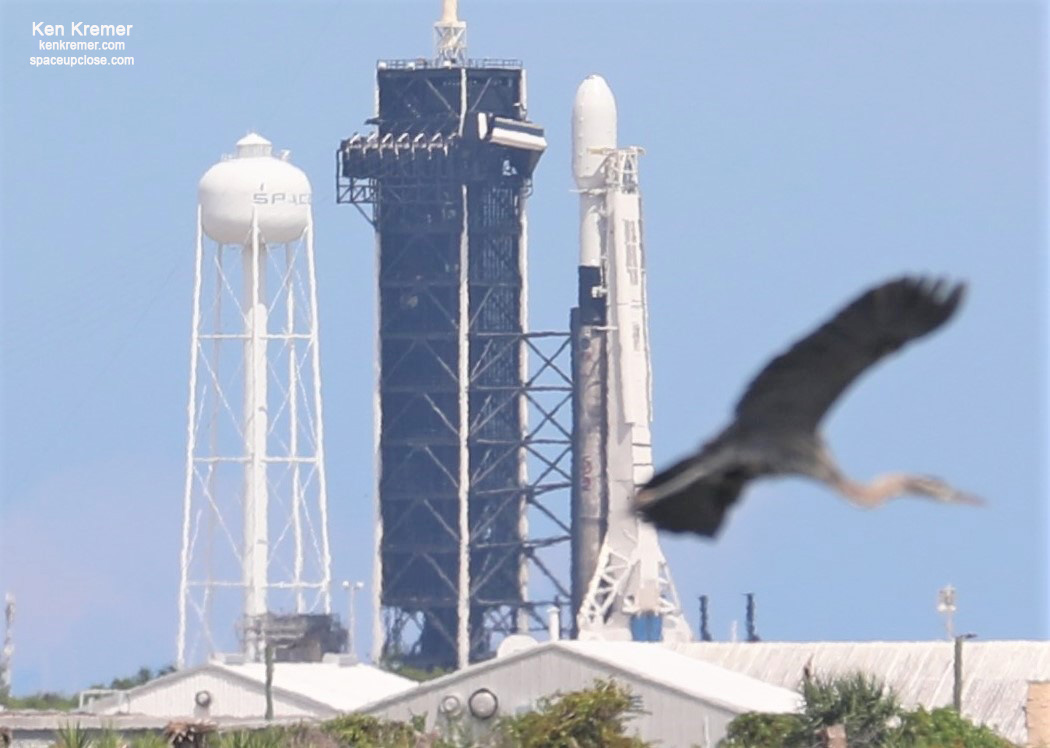
As Hurricane Sally was striking the Florida panhandle and Pensacola and inundating and devastating the inland region with hurricane force winds of 105 MPH and torrential rains up to 2 feet its outer bands were flooding inland areas and packing strong winds all the way across the southeast US stretching into the Atlantic Ocean booster recovery area off the Carolina’s coast – an additional 4 tropical storms in the eastern Atlantic were also growing in strength and creating high waves and very strong currents that were in excess of the leveling capabilities of the thrusters on SpaceX’s ‘Just Read the Instructions’ recovery droneship sea going platform upon which the first stage booster B1058.3 would make a propulsive upright touchdown.
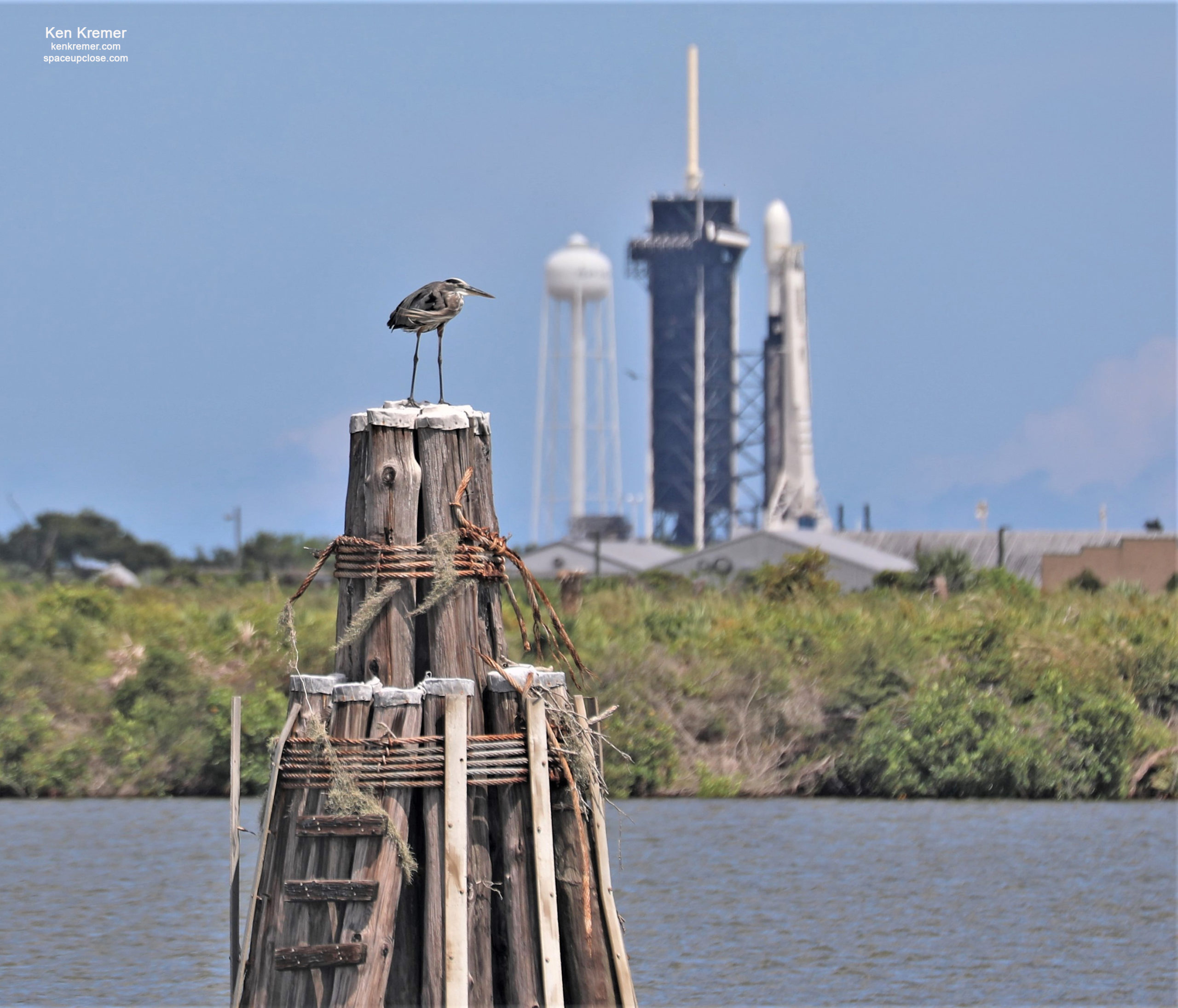
Since the booster recovery operation is now stipulated as a primary mission goal to recycle rocket for future reuse SpaceX engineers decided to scrub the Starlink launch at KSC at the last moment just as they were about to enter the terminal countdown and thus not start propellant loading for the Falcon 9 rocket raised at pad 39A at NASA’s Kennedy Space Center.
The currents were just too strong for JRTI to maintain landing position despite prior thruster upgrades said Elon Musk.
“Current was too strong for droneship to hold station. Thrusters to be upgraded for future missions,” tweeted SpaceX CEO Elon Musk.
Current was too strong for droneship to hold station. Thrusters to be upgraded for future missions.
— Elon Musk (@elonmusk) September 18, 2020
So to me Thursdays last minute delay was not at all surprising as I had been expecting it due to rather por recovery area weather conditions – that had already forced of the twin fairing recovery ships to abandon the booster landing zone.
“Standing down from today’s Starlink launch due to recovery issue; vehicle and payload remain healthy. Next launch opportunity is tomorrow, September 18 at 1:57 p.m. EDT, but we are keeping an eye on weather,” SpaceX tweeted just prior to terminal countdown.
Standing down from today's Starlink launch due to recovery issue; vehicle and payload remain healthy. Next launch opportunity is tomorrow, September 18 at 1:57 p.m. EDT, but we are keeping an eye on weather
— SpaceX (@SpaceX) September 17, 2020
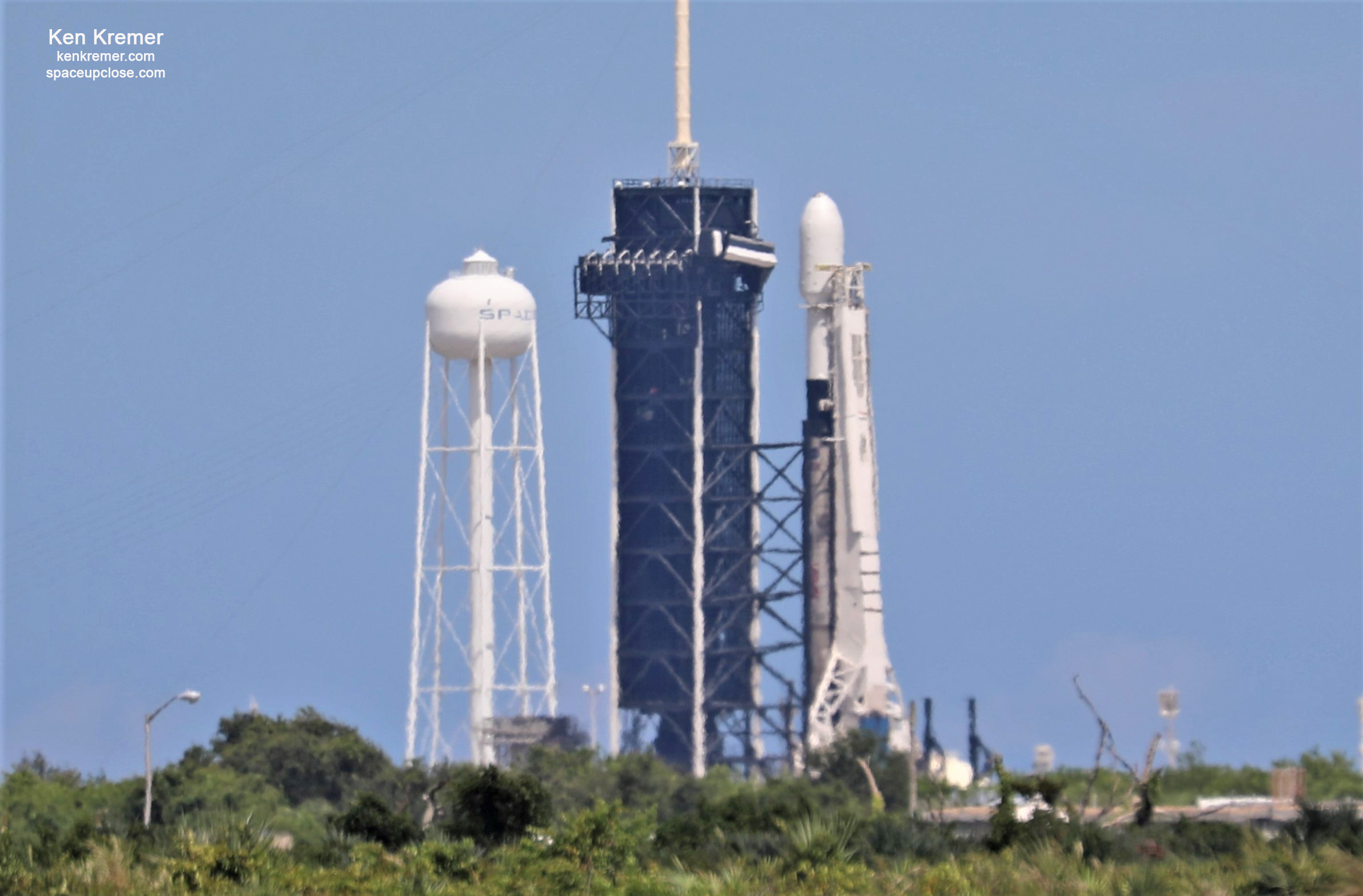
SpaceX had been targeting Thursday, September 17 at 2:19 p.m. EDT (1819 GMT) for launch of its thirteenth Starlink mission from Launch Complex 39A (LC-39A) at NASA’s Kennedy Space Center in Florida carrying 60 Starlink satellites to low earth orbit.
However continuing severe weather has forced a significant delay as the football filed sized JRTI and the twin fairing ships all return to safe harbors in Port.
“Standing down from tomorrow’s launch of Starlink due to severe weather in the recovery area, which is likely to persist for a couple days. Will announce a new target launch date once confirmed,” SpaceX tweeted late Thursday evening Sept. 17.
Standing down from tomorrow’s launch of Starlink due to severe weather in the recovery area, which is likely to persist for a couple days. Will announce a new target launch date once confirmed
— SpaceX (@SpaceX) September 18, 2020
Initially SpaceX announced they would try again 24 hours later on Friday afternoon, Sept. 18 – but the weather odds were only 30% GO down from 70% GO on Thursday
The mission is also utilizing a recycled nose cone half for the second time and marks the 2nd Falcon 9 Starlink launch this month.
“A fairing half supporting this mission previously supported Starlink missions in May 2019 and March 2020.”
twitter.com/spacex/status/1306378024711905280
The ever expanding Starlink constellation now numbers approximately 713 refrigerator sized flat panel broadband satellites aimed at serving rural and underserved areas across the globe.
There are no rideshare payloads on this flight.
Falcon 9’s first stage previously supported supported launch of Crew Dragon’s first flight to the International Space Station on May 30 with NASA astronauts Bob Behnken and Doug Hurley onboard and the ANASIS-II commercial communications satellite mission on July 20.
Following stage separation, SpaceX will land Falcon 9’s first stage on the “Just Read the Instructions” droneship, which is stationed in the Atlantic Ocean.
Droneship JRTI was already waiting at its stationing position some 400 mi (640 km) north east of KSC off the coast of the Carolina’s with a football field sized platform.
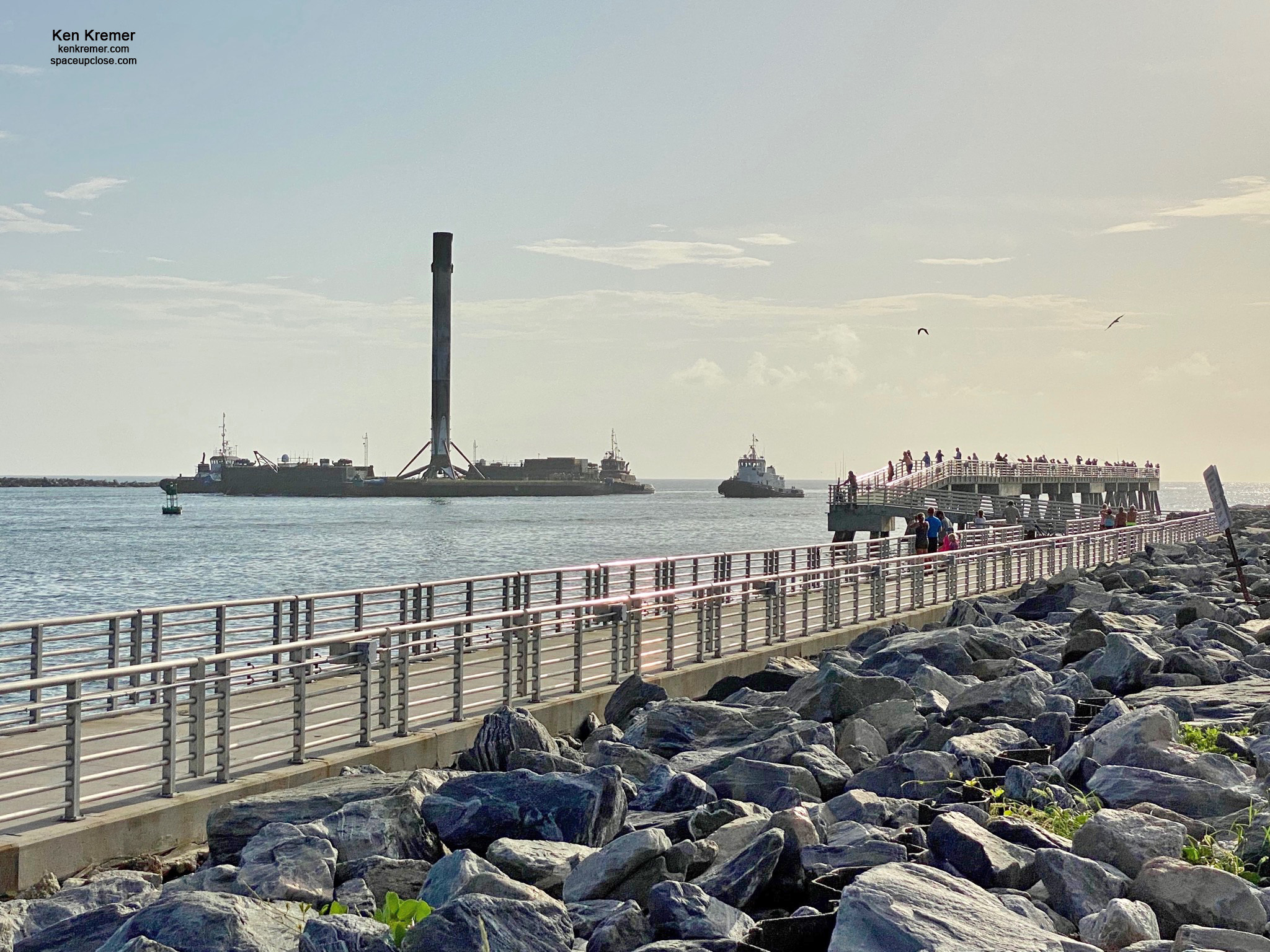
The Starlink satellites will deploy approximately 1 hour and 1 minute after liftoff.
If all goes well the Starlink constellation will rise to about 773 launched satellites
SpaceX says you can sign up to receive updates on Starlink news and service availability in your area. Please visit starlink.com.
SpaceX had also dispatched its fleet of payload fairing catcher boats GO Ms. Tree and GO Ms. Chief to try and catch and retrieve both nose cone halves from the mission.
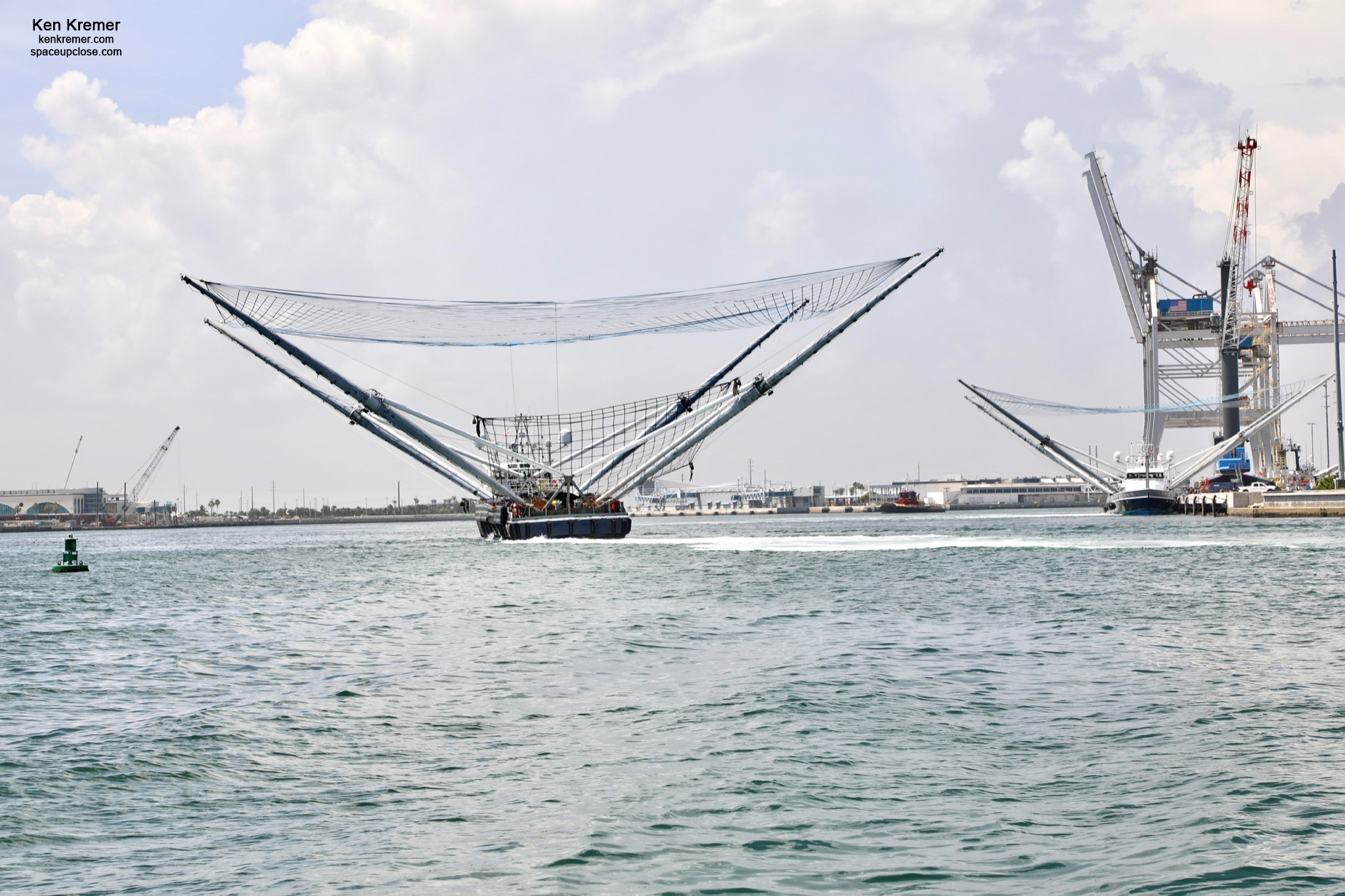
The prior Starlink mission launched on Sept. 3 and the recovered / landed booster returned to Port Canaveral atop the OCISLY droneship on Sept. 6.
To date this year SpaceX has launched a total of 16 Falcon 9 rockets – a high launch cadence only made possible by reusing 1st stage boosters.
Only two of those were with newly manufactured rockets – including the Demo-2 astronaut launch for NASA in May.
The remaining boosters were all recycled from prior missions.
The two stage Falcon 9 rocket stands 229 feet (70 meters) tall.
Watch my live interview discussion of current space missions and launches on the Fri Sept. 18 edition of the ‘Stay Curious’ daily weekday space show presented and hosted by the American Space Museum, Titusville, FL, direct from the Florida Space Coast:
https://www.facebook.com/175507880819/videos/1058636561206413
Video Caption: Space Journalist Dr. Ken Kremer updates “Stay Curious” on space news on Sept. 18, 2020. Our 25th “Stay Curious” week ends with space journalist Dr. Ken Kremer joining MarQ & Marty to update you on the latest news from the Space Coast…all to bridge the space between us. Credit: American Space Museum
Watch my post scrub interview of WXTV ABC News Ch 9 Orlando on Sept 17:
https://www.wftv.com/video/?id=c9c5de7b-3e9f-4538-9788-489e0566bca9
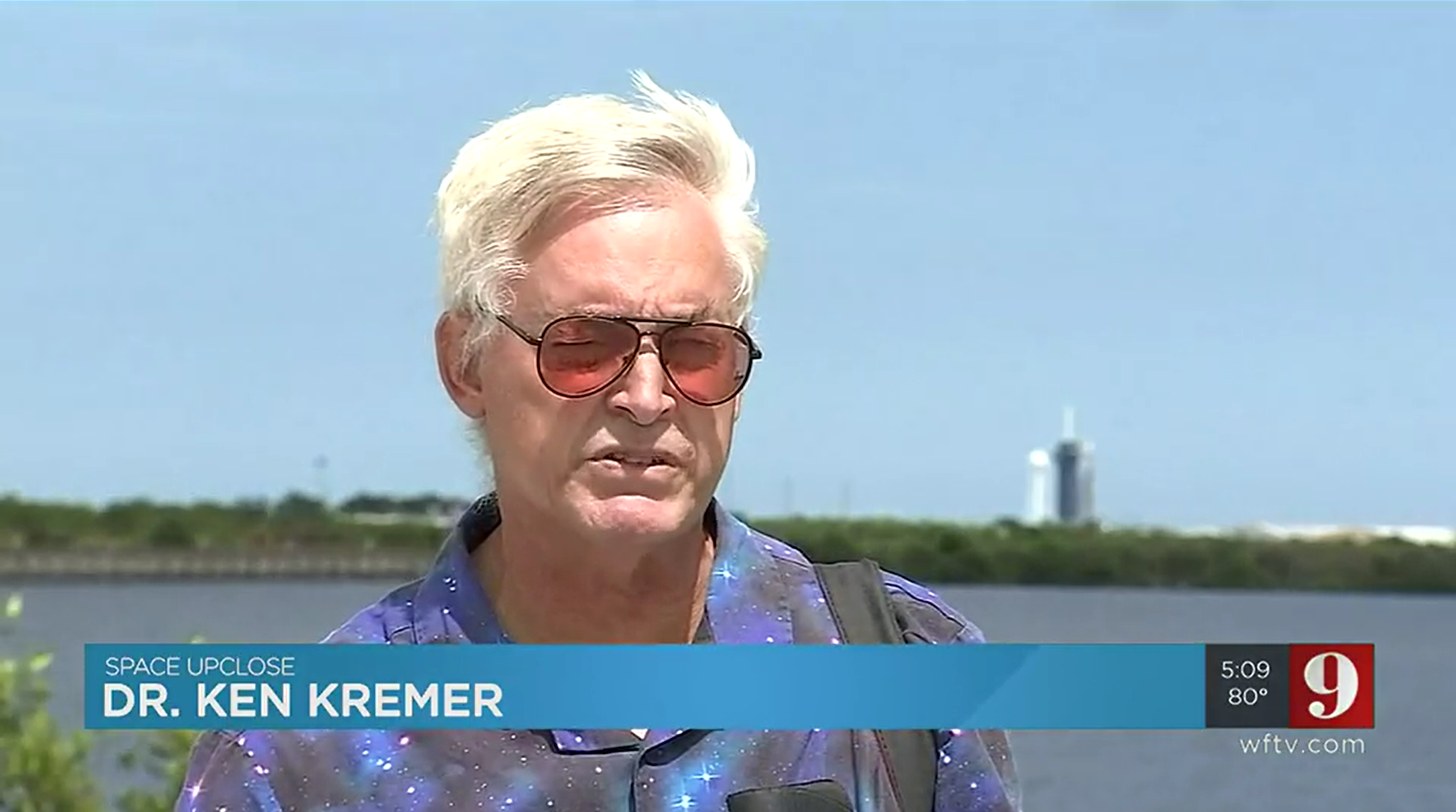
Watch Ken’s continuing reports about Starlink, Commercial Crew and Artemis and onsite for live reporting of upcoming and recent SpaceX and ULA launches including Demo-2, Starlink, X-37B, Solar Orbiter, Mars 2020 and more at the Kennedy Space Center and Cape Canaveral Space Force Station.
Stay tuned here for Ken’s continuing Earth and Planetary science and human spaceflight news: www.kenkremer.com –www.spaceupclose.com – twitter @ken_kremer – email: ken at kenkremer.com
Dr. Kremer is a research scientist and journalist based in the KSC area, active in outreach and interviewed regularly on TV and radio about space topics.
………….
Ken’s photos are for sale and he is available for lectures and outreach events
Please consider supporting Ken’s work by donating at Patreon:



